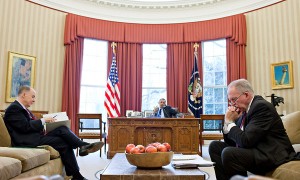Lamar Smith’s Futile Leak Investigation
Lamar Smtih has come up with a list of 7 national security personnel he wants to question in his own leak investigation. (h/t Kevin Gosztola)
House Judiciary Committee Chairman Lamar Smith, R-Texas, told President Obama Thursday he’d like to interview seven current and former administration officials who may know something about a spate of national security leaks.
[snip]
The administration officials include National Security Advisor Thomas Donilon, Director of National Intelligence James Clapper, former White House Chief of Staff Bill Daley, Assistant to the President for Homeland Security and Counterterrorism John Brennan, Deputy National Security Advisor Denis McDonough, Director for Counterterrorism Audrey Tomason and National Security Advisor to the Vice President Antony Blinken.
Of course the effort is sure to be futile–if Smith’s goal is to figure out who leaked to the media (though it’ll serve its purpose of creating a political shitstorm just fine)–for two reasons.
First, only Clapper serves in a role that Congress has an unquestioned authority to subpoena (and even there, I can see the Intelligence Committees getting snippy about their turf–it’s their job to provide impotent oversight over intelligence, not the Judiciary Committees).
As for members of the National Security Council (Tom Donilon, John Brennan, Denis McDonough, Audrey Tomason, and Antony Blinken) and figures, like Bill Daley, who aren’t congressionally approved? That’s a bit dicier. (Which is part of the reason it’s so dangerous to have our drone targeting done in NSC where it eludes easy congressional oversight.)
A pity Republicans made such a stink over the HJC subpoenaing Karl Rove and David Addington and backed Bush’s efforts to prevent Condi Rice from testifying, huh?
The other problem is that Smith’s list, by design, won’t reveal who leaked the stories he’s investigating. He says he wants to investigate 7 leaks.
Smith said the committee intends to focus on seven national security leaks to the media. They include information about the Iran-targeted Stuxnet and Flame virus attacks, the administration’s targeted killings of terrorism suspects and the raid which killed Usama bin Laden.
Smith wants to know how details about the operations of SEAL Team Six, which executed the bin Laden raid in Pakistan, wound up in the hands of film producers making a film for the president’s re-election. Also on the docket is the identity of the doctor who performed DNA tests which helped lead the U.S. to bin Laden’s hideout.
But his list doesn’t include everyone who is a likely or even certain leaker.
Take StuxNet and Flame. Not only has Smith forgotten about the programmers (alleged to be Israeli) who let StuxNet into the wild in the first place–once that happened, everything else was confirmation of things David Sanger and security researchers were able to come up with on their own–but he doesn’t ask to speak to the Israeli spooks demanding more credit for the virus.


